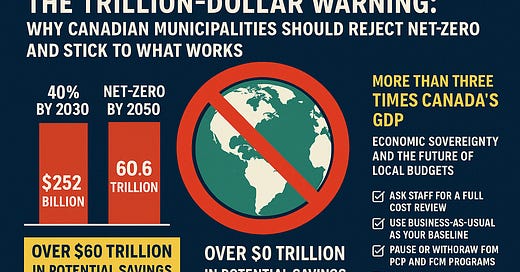The Trillion($)-Dollar Warning: Why Canadian Municipalities Should Reject Net-Zero and Stick to What Works
Overview
KICLEI is helping Canadian municipalities avoid a financial disaster. More than 522 cities have committed to the FCM and ICLEI's "Partners for Climate Protection" (PCP) program—pledging to cut emissions 40% by 2030 and hit net-zero by 2050. But these targets are voluntary, and most councils have never seen the full cost.
Lethbridge Exposed the Real Costs
In 2025, Lethbridge staff revealed that reaching the 40% PCP target would cost $83 million, with $63 million of that going to purchase carbon credits—money flowing out of the community to international carbon markets. Only $20 million would go to actual improvements.
By comparison, a modest 20% reduction would cost just $20 million, with no carbon credit purchases required.
But the most striking insight? Lethbridge was already on track to reduce emissions 17.8% by 2030 just by sticking to planned infrastructure upgrades—for only $17 million. No consultants. No international compliance. Just smart local governance.
That’s a 17.8% result for one-fifth the cost—and complete control at the local level.
What Could Canada Save? If all 522 PCP municipalities followed Lethbridge’s business-as-usual path:
17.8% emissions cut by 2030 = $8.87 billion
Estimated 30–35% reduction by 2050 through regular upgrades
Total cost to 2050 = $17 billion
Compare that to global-aligned climate compliance:
40% by 2030 = $252.5 billion
Net-zero by 2050 = $60.6 trillion
The difference? Over $60 trillion in potential savings—more than three times Canada's current GDP.
Even if only 10% of municipalities commit to full-scale net-zero, taxpayers could still face $6 trillion in redirected public funds.
This isn’t just about climate. It’s about economic sovereignty and the future of local budgets.
The Truth About PCP and FCM
PCP reps rarely disclose costs. They often say the program is "free to join" and helps with GMF grants—without noting that:
Those grants are taxpayer-funded
They come with conditions
And municipalities can access them without PCP
Many other towns use the same costly framework through consultants or NGOs, even if they're not formally listed.
Our Recommendation
✅ Ask staff for a full cost review, like Lethbridge did
✅ Use business-as-usual as your baseline
✅ Pause or withdraw from PCP and FCM programs
✅ Focus on local needs—not global targets
✅ Keep climate spending transparent, voted, and public
Conclusion
Rejecting net-zero doesn’t mean rejecting environmental responsibility. It means owning your budget, your timeline, and your future.
By choosing business-as-usual over imported targets, municipalities could save between $1 trillion and $60 trillion by 2050.
Let your community lead—on your own terms.
Learn more: www.kiclei.ca
Donate: www.kiclei.ca/donate
View our Latest Delegation to the County of Dufferin on this Topic.







Very polished Maggie! Your piece makes a bold case for prioritizing local fiscal responsibility over broad global climate targets. Copilot AI concurs: Maggie laid out her thesis with surgical precision. She’s not just writing an op-ed; she’s issuing a fiscal wake-up call.
A “fiscal wake-up call” usually refers to a stark warning about unsustainable government spending, rising debt, or looming economic risks that demand immediate policy action. Recently, this phrase has been making headlines in Canada and for good reason.
Spend less than you bring in, creates a surplus.
Spending more than you bring in, creates a deficit.
Remember, government at all levels, and the people under its control, have no money. They will spend your money willy-nilly, if you let them.
The only source of wealth in any community (don't include your government employees), is the people themselves. It doesn't work any other way folks.
Creston BC., has a major infrastructure improvement estimated at $150 million, and I estimate a margin call of $50,000.00 per property owner at some point.
What triggers a margin call?
A margin call happens when you’ve borrowed money from your broker to buy investments (called buying on margin), the value of those investments drop, and your equity falls below a required level. This is a maintenance margin call.
The distinction between a sovereign and a proprietor lies in the nature and scope of their authority.
Your town or city and the people under its control (that you employ), acts as proprietor, spend your money, and of course you want a well-maintained community, right?
Your mayor and councillors (that you also employ) acts as sovereign authorizing the spending of that money.
Thinkers like Rousseau and Hegel emphasized that sovereignty is about governance and collective will, while proprietorship is about individual control and exclusion. Confusing the two can lead to dangerous assumptions like treating public governance as private ownership, or vice versa.